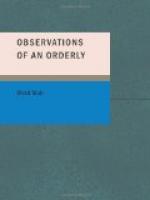Many were the choice examples of slang and of colloquialisms which I culled in the bathroom, sitting comfortably in my bath and communing with my neighbour in the next bath. I remember one morning making the acquaintance of an Australian who had recently recovered from a bad attack of trench feet. Four of the toes of one foot were missing, and the fifth looked far from sound. My friend was examining this lonely toe with a critical gaze, and I sympathised with him over its condition. “Ah!” he said, “that toe is a king to what it was.” He went on to tell me (what I could well believe) that to get your “plates of meat” frostbitten wasn’t such a “cushy wound” as it was cracked up to be by those who had never experienced its sufferings. “When I went sick the doctor thought he’d rumbled me swinging the lead. But as soon as he spotted them there toes of mine—the ones that’s gone—I could see he knew I’d clicked a packet, square dinkum, this trip.” ("Square dinkum” or “dinkum” is an Antipodean verbal flourish, which broadly approximates to the American “Sure enough” or the English “Not ’arf.”)
Certain of these neologisms are common enough in civilian life—have been imported into the army since 1914—but others (and the more interesting ones, as I hold) were, until the war, limited to the barrack-room. British regiments which had been abroad used an argot of considerable antiquity, some of it of Oriental origin (e.g. “blighty,” meaning “home”: hence “a blighty wound,” or simply “a blighty,” an injury sufficiently serious to cause the victim to be invalided to England). Whether the derivations of army slang have been investigated I do not know. It appears to me to be a subject worth examination. I am not myself a philologist, but in the bathrooms and elsewhere in the hospital I have heard and noted a small collection of slang phrases and idioms, and these may be worth recording. Such expressions as “swinging the lead” (malingering or deceiving or acting in a hypocritical manner or getting the better of anyone) have lost their novelty. So has “rumbled,” which means to be discovered or detected or found out. These words have now spread far beyond the confines of the army. And indeed the rapidity with which all slang and all catch-phrases can be disseminated offers a rather alarming prospect. For whereas, before the war, slang at its silliest was often quite local, nowadays its restriction within given localities has in the nature of things become impossible. A war hospital such as ours contains inmates from every county in Britain, as well as from every colony. The same intermingling occurs on an infinitely greater scale in training-camps and at the various fronts. All these centres are hotbeds of slang: the men go home from them, carrying to their native places slang which would never, in ordinary times, have penetrated there. In the army you will hear a Scotchman doing what he never did before—dropping his aitches. He




